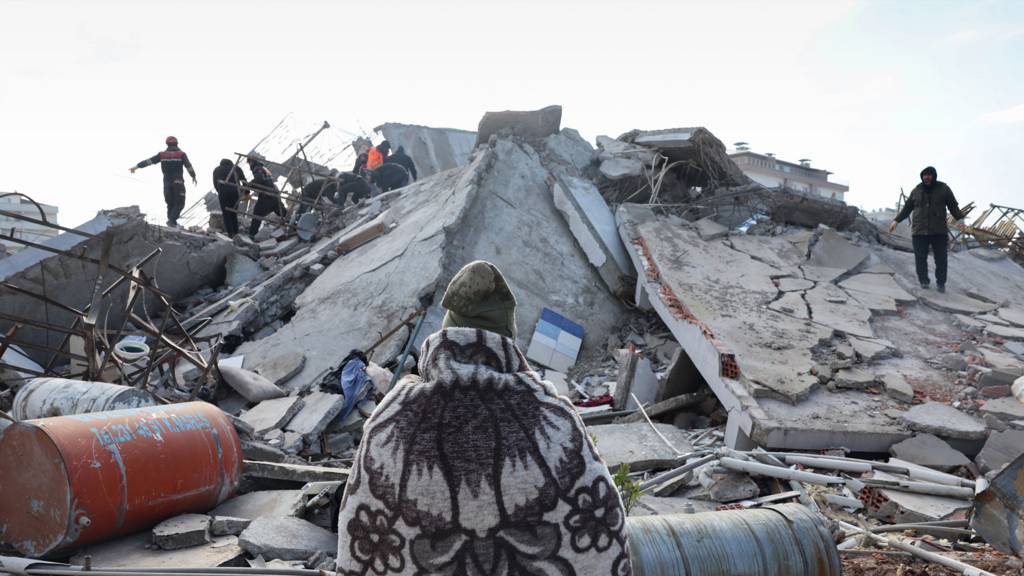
Impossible to prepare for disasters this big, Turkey's president says
Updates from BBC correspondents on the ground: Quentin Sommerville in Antakya, Tom Bateman in Adana, Alice Cuddy in Iskenderun, and Anna Foster in Kahramanmaras
Related Video and Audio
RTL
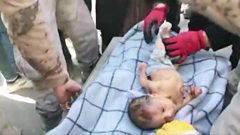
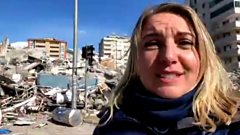
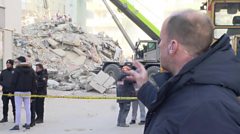
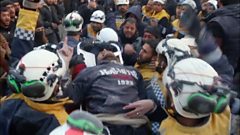
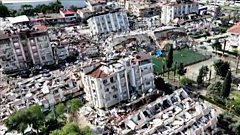
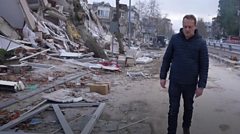
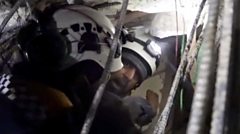
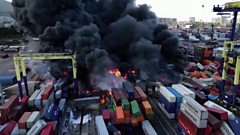
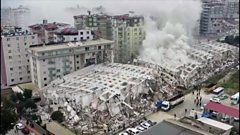
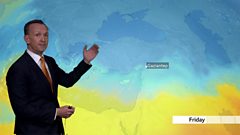

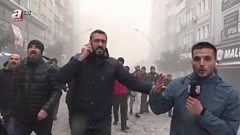
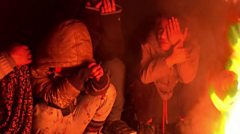
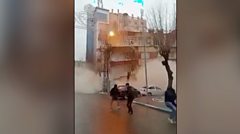
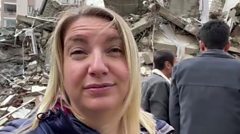
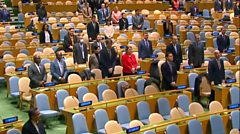
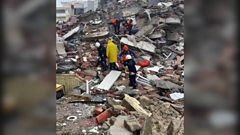
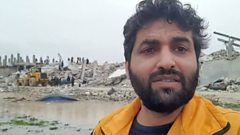
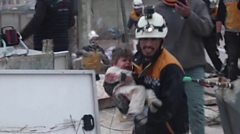
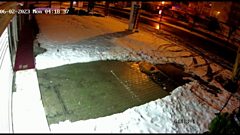
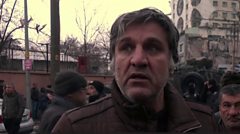
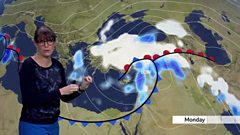
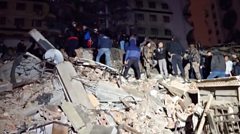
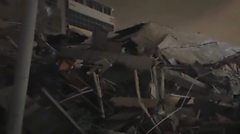
Live Reporting
Edited by Sarah Fowler
All times stated are UK
Get involved
Cold weather has seriously hampered rescue response - charity worker
Paul Taylor from disaster response charity Re:Act has travelled to Turkey to help with the relief effort.
Speaking to the BBC from Gaziantep, in southern Turkey, he says the cold weather means vehicles like 4x4s have not been able to reach certain areas.
He adds that in his experience of disaster management, the aftermath of any event of this magnitude is "always chaos," but "things will improve" as more aid arrives.
"What we’re seeing at the moment is a localised response, so government officials, police, military, local NGOs and spontaneous volunteers doing what they can," he says, adding that the international community is now arriving too.
"Eventually things will get better," he says.
'Terrifying scenes' in Syrian town of Jindayris
Many of the rescue videos that have emerged from opposition-held north-western Syria since Monday have come from the small town of Jindayris, where around 50 buildings are reported to have collapsed.
On Tuesday, a doctor at a local hospital said a newborn baby girl who was filmed being pulled from the rubble was in a stable condition. Her mother, father, four siblings and aunt did not survive.
Earlier we learnt from the head of the White Helmets, whose volunteer first responders are leading the rescue effort in opposition-held areas, that more than 300 people are now known have been killed in Jindayris alone.
Raed al-Saleh tweeted that 800 others had been injured and warned that there were “terrifying scenes” on the ground.
“A catastrophic situation, destruction everywhere,” he wrote. “Hundreds of families are still under the rubble, and our teams are working with all their energy in the destroyed locations.”
This drone footage showing the devastation in Jindayris was posted by the White Helmets on Tuesday night.
Twitter access restricted in Turkey
Access to Twitter has been restricted in Turkey, according to internet monitoring service NetBlocks.
The group, which tracks connectivity across the globe, tweeted early this afternoon that real-time network data showed a restriction of the social media site across numerous major internet providers.
A later update said the block had been extended to even more providers. The AFP news agency also said its reporters in Turkey were unable to access Twitter unless they were using a VPN, a tool that hides a user's location.
NetBlocks said Turkey has an "extensive history of social media restrictions during national emergencies and safety incidents" and that the restriction "comes as the public come to rely on" Twitter in the aftermath of the earthquake.
Since the quake on Monday, many users have used social media to express anger and frustration about the speed of the state response and the lack of help reaching some areas.
Turkish police have detained more than two dozen people over social media posts critical of the government's handling of the crisis, the AFP reports.
Speaking today during a visit to the city of Kahramanmaras, one of the worst-hit areas, President Erdogan encouraged people to listen only to communication from the authorities and to ignore "provocateurs".
Lack of heavy-lifting equipment slows rescue effort in Syria
Across the street from an Aleppo apartment building which was reduced to rubble by the quake, 25-year-old Youssef has waited for two days for news of his father, mother, brother, sister and her son.
He said he had heard their voices and spoken to them, but emergency workers had not been able to reach them.
"I talked to them and heard their voice, but unfortunately - as you can see here - they're very slow at work and they don't have enough equipment," he told Reuters news agency.
And in nearby Jandaris, relatives of people who had been living in a now collapsed apartment block said they had seen no one taken out alive so far.
They blame a lack of machinery to lift the heavy concrete slabs which may have trapped loved ones.
Rescue workers have struggled to reach some of the worst-hit areas, held back by destroyed roads and poor weather. Some areas are also without fuel and electricity.
Erdogan: 'Impossible to prepare for this'
Turkey's president has hit back at mounting anger over the state's response, saying: "It is not possible to be prepared for a disaster this big."
Recep Tayyip Erdogan told reporters the official death toll had climbed to 9,057 during a visit to Hatay, one of the region's hardest hit by the earthquake.
He described people saying they hadn't seen security forces at all in some areas as "provocateurs".
"This is a time for unity, solidarity. In a period like this, I cannot stomach people conducting negative campaigns for political interest," he added.
During another stop on his tour of areas in the disaster zone earlier today, he acknowledged some initial problems but said the situation was now "under control".
Criticism from opposition figures and on the ground is growing. Some claim that emergency efforts have been too slow and that not enough was done to prepare the earthquake-prone region during his eight years in office.
We will provide all the support asked of us, says UK PM
Video content
UK Prime Minister Rishi Sunak was quizzed a little earlier today about the government's initial response to Monday's earthquake.
Asked by Labour MP Feryal Clark about the importance of ensuring "our response meets the scale of this crisis", Mr Sunak said he had spoken to Turkey's President Erdogan on Tuesday to reiterate the UK's commitment to help.
"We will continue to provide all the support that is asked of us," he said during his weekly Prime Minister's Questions session.
From war to disaster for Syrians in Turkey
Millions of Syrians have fled civil war into Turkey only to meet a new catastrophe.
In Diyarbakir, east of the epicentre, crowds have gathered outside the morgue.
Mercan al Ahmad, 17, is unable to contact family back home in Aleppo.
She told AFP: "We escaped death in Syria, and now we were struck by an earthquake in Turkey.
"We can't sleep. We are scared. We live in fear of another strong aftershock."
Ridwan Gurre, 42, has spent two nights sleeping in the mosque, AFP reported.
He said: "When we were in a war, we knew that when the planes flew overhead, it was time to take shelter.
"When the earthquake came at such an unexpected hour, we didn't know what would happen next."
EU to send Syria €3.5m in aid
The EU has confirmed it will send €3.5m (£3.1m) in aid to Syria on Wednesday.
The announcement comes after Syria officially asked for assistance under a scheme designed to support countries hit by natural disaster by activating the EU’s Civil Protection Mechanism.
The bloc has also announced an initial €3m (£2.7m) in aid to Turkey, after the country activated the EU's Civil Protection Mechanism on Monday.
Earlier on, our Brussels correspondent explained that sending teams to Syria would be more complicated than Turkey, as control in the north is divided between the government and rebel groups.
People are lost, they need help - Syrian doctor
Dr Mohammed, who is from the Syrian city of Idlib and is there working with the charity Hand in Hand for Aid and Development, says the people there "are lost" with limited help in the hospital he's working in.
“We don’t have electricity. We’re managing the hospital through generators, to continue to provide services," adding that more medical supplies are needed.
Speaking to Radio 5 Live's Naga Munchetty, he says many have been left with nothing: “The people are asking for shelter, for food in the street, for water. They need help."
“This is our world now; it had been for ten years. I’m doing my best and I will manage myself here, to stay safe the most I can” he says.
“We’ve survived many crises before so, as Syrians, we keep trying."
What's the latest news?
It's some 60 hours since Monday's massive earthquake, with a huge international rescue effort now working at pace to help the millions of injured and homeless. Here's a recap of events so far today.
Some aid arriving in Syria, state media report
Flights carrying aid from Iraq, Iran, Jordan, UAE and Egypt are arriving in Syria, according to reports.
Bashar al-Assad's government has requested help from the international community, including the European Union.
Sana, the Syrian state-run news agency, has given prominent coverage to the arrival of aid, both from allies and countries traditionally considered less close to the government, BBC Monitoring reports.
Getting supplies into the fractured nation was already extremely difficult before the earthquake decimated communities in the north-west.
The Assad regime, which controls most of the country after 12 years of civil war, stood accused of preventing aid from reaching the last rebel-held stronghold in Idlib province prior to this week's disaster.
The region, where millions of displaced people live in poverty, has been hardest hit by the earthquake.
The government only allows aid to be brought in via Turkey on a single road, the Bab al-Hawa Border Crossing.
The EU Commission said it encourages members to send medical supplies and food but warned the Syrian government must not seek to divert it away from badly hit areas beyond its control.
White Helmets issue plea for help 'before time runs out'
We've been finding out how volunteers with the White Helmets civil defence organisation are getting on with their search and rescue operation in Syria.
The UK government said on Tuesday it was increasing its funding to the group, which was set up in 2014 during the war and is made up of volunteers that have helped with civilian evacuations and rescue operations after bombings.
A spokesperson told BBC News it needed more aid and equipment as they rushed to find survivors following the devastating quake - which White Helmets say has killed more than 1,280 people and left at least 2,600 in Syria.
They said: "We are rushing to do what we can before time runs out but with every minute that passes the chance of finding people alive grows smaller.
"That's why we desperately need the international community to act fast and ensure more aid can reach northern Syria.
"We urgently need more specialist search and rescue equipment, spare parts and fuel for ambulances due to the number of collapsed buildings and damage to our existing equipment."
You can read more here about what different organisations are doing to help.
Reality Check
Investigating the false images of Turkey destruction
Pictures and video from previous disasters in other countries have been shared by people on social media with claims that they show the current destruction caused by the earthquake in Turkey and Syria.
One tweet - from a verified Twitter user - claimed to show a nuclear plant exploding in Turkey. It got more than 1.2 million views.
Reality Check ran the images through a search engine to see if they had appeared online before.
This revealed that they were actually from the aftermath of the Beirut explosion in August 2020.
They've labelled the claim in the tweet 'false' - you can see more examples in this piece.
WATCH: 'They buried my brother without us'
BBC World Service reporter Selin Girit travelled on Tuesday evening with families trying to reach loved ones caught up in one of Monday's earthquakes in Turkey.
But heavy traffic on the road has been frustrating those trying to get back to their families, as well as those going to help with the relief effort.
Video content
Tragedy unfolds in the wreckage of Adana's streets
Tom Bateman
Reporting from Adana
We’ve spent the morning alongside a collapsed 10-storey building in Adana, where rescue workers are currently focusing their efforts.
The wreckage spans well beyond the block’s foundations.
Sometimes the diggers are switched off and everybody is asked to remain silent. The crowd swells, as people hope they’ll be news of a survivor. But there never is.
Behind the police tape, families of the missing wait, huddled around fires. They’ve stayed here day and night. They wait patiently, tearfully, for news. But it’s all been bad.
Since last night recovery teams have removed at least eight bodies, including that of a child, from the wreckage. The families know they must then identify the body.
By now, there’s a tragic ritual to it all. Teams take the body into an ambulance behind the police cordon and relatives are asked to come and tell them who it is.
Charity worker says there's a shortage of body bags
Salah Aboulgasem, an aid worker for the charity Islamic Relief, has travelled from the UK to Gaziantep in southeast Turkey to help with the humanitarian effort.
Despite having been to “many war zones, many disaster zones… this is by all means one of the most devastating I’ve ever seen," he said.
He said the first 72 hours on the ground were focused on "trying to save as many lives as we can".
"It’s a real race against time,” he adds.
“[Rescuers] are requesting more body bags, because of the amount of bodies they’re recovering from the rubble," sayd Salah.
There are also chilling reports from colleagues in Syria of mass graves being dug to cope with the volume of bodies, he adds.
He was speaking to BBC Radio 5 Live.
Erdogan meets survivors on visit to epicentre
We have some pictures in from today's visit by President Erdogan to the city of Kahramanmaras, or Maras, for short.
It was at the epicentre of the second earthquake to hit Turkey on Monday and sits only around 40 miles north of the epicentre of the first.
Speaking to reporters, Erdogan acknowledged there had been issues with the state's initial response to the quake but insisted that the situation was "under control".
Relatives are checking the faces of the dead
As well as experiencing long waits for aid, many in the areas hit by the earthquake have found it difficult searching for and getting information about the fates of missing relatives.
Outside a hospital in the city of Antakya, dozens of bodies, some in body bags, others covered by blankets and sheets, are lined up on the ground.
"My wife doesn't speak Turkish, and I can't see very well," one man, who did not give his name, told Reuters.
"We have to check all the faces. We need help."
Reporting from the Antakya, which is only around 80 miles south of the earthquake's epicentre, the BBC's Quentin Somerville said the scale of the devastation there would "overwhelm pretty much any government".
Watch his report here.
Syrian government asks for help from EU
Jessica Parker
Brussels correspondent
Syria has now officially asked for assistance under a scheme that’s designed to support countries hit by natural disasters - the EU’s Civil Protection Mechanism.
Turkey had already done so - with search and rescue teams en route or in the country - but has now broadened its request for help to things such as blankets, tents and heaters.
In Brussels, at a crisis management centre, they're working out what help can be coordinated.
Sending teams to Syria would be more complicated than Turkey – with control in the north divided between the government and rebel groups.
Yesterday, the EU said it was seeking to provide aid in Syria through existing humanitarian networks.
Brussels does not recognise Bashar al-Assad as a legitimate head of state and has imposed sanctions on the regime – with generally low-level contacts between Damascus and Brussels.
A European Commission spokesman has also said that teams must have the support of the authorities on the ground, otherwise it would be impossible to work in an effective and safe way.
Death toll rises in war-torn Syria
More than 2,660 people have now been confirmed dead in Syria, according to authorities on the ground.
Syria’s health minister says the number of deaths in government-controlled areas has risen to 1,262, according to the state-run Sana news agency. A further 2,285 people have been injured, reports say.
Meanwhile, the White Helmets, who operate civilian evacuations and search and rescue operations in opposition-held areas of north-western Syria, have reported more than 1,400 deaths and 2,700 injuries.
The White Helmets have warned that hundreds of families remain trapped under the rubble and so the number of dead will inevitably rise.
Earlier, the volunteer organisation said four of its members, and their families, had been killed in the quake.
The rescue effort has been hampered by the ongoing civil conflict, with the region contested between Russian-backed government forces, jihadists, Turkish-backed rebels and Kurdish-led fighters.
Even before the earthquake struck, the situation in the region was critical, with freezing weather, crumbling infrastructure and a cholera outbreak causing misery for those who live there.
Around 4.1 million people - most of them women and children - are dependant on humanitarian aid to survive.